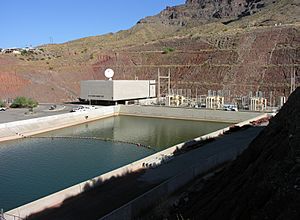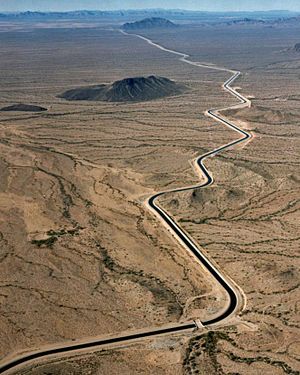Central Arizona Project facts for kids
Quick facts for kids
Central Arizona Project
|
|
|---|---|
 |
|
| Lua error in Module:Location_map at line 420: attempt to index field 'wikibase' (a nil value). | |
| Begins | Lake Havasu, La Paz County |
| Ends | Pima Mine Road, Pima County |
| Characteristics | |
| Total length | 336 mi (541 km) |
| History | |
| Construction start | 1973 |
| Opened | 1993 |
The Central Arizona Project (CAP) is a huge canal system in Arizona, USA. It is about 336 miles (541 km) long. This amazing project moves water from the Colorado River to central and southern Arizona.
The CAP helps bring water from Lake Havasu near Parker to many places. It is managed by the Central Arizona Water Conservation District. Important leaders like Carl Hayden helped make this project happen.
Contents
What is the Central Arizona Project?
Bringing Water to Arizona
The Central Arizona Project (CAP) delivers water from the Colorado River. This water goes to central and Southern Arizona. The project was planned to bring water to almost one million acres (405,000 hectares) of farmland. These farms are in Maricopa, Pinal, and Pima counties.
The CAP also provides drinking water for many Arizona cities. This includes big cities like Phoenix and Tucson. Besides providing water, the project helps with other things. It helps control floods and offers places for outdoor fun. It also protects fish and wildlife.
How the Canal Works
The CAP canal is very long. But some water is lost each year. About 16,000 acre-feet (5.2 billion gallons) of water evaporates. This amount might grow as temperatures get hotter. Also, about 9,000 acre-feet (2.9 billion gallons) of water leaks through the concrete.
History of the Central Arizona Project
How the CAP Began
The idea for the CAP started a long time ago. The project was officially created by a law in 1968. US President Lyndon B. Johnson signed this law on September 30, 1968.
Many Arizona leaders worked hard to make the CAP happen. Senators Ernest McFarland and Carl Hayden were key figures. Later, Senator Barry Goldwater and the Udall brothers, Mo Udall and Stewart Udall, also helped. They all worked together to pass the law. This was a big team effort for Arizona.
The law also helped Arizona get power. It allowed the US government to get power from the Navajo Generating Station. This power helps run the CAP system.
Building the Canal
Construction of the CAP began in 1973. The first work was on the Havasu Pumping Plant near Lake Havasu. Other parts of the project were built later. This included the New Waddell Dam.
The main canal system is about 336 miles long. It runs from Lake Havasu all the way to Tucson. This main part was mostly finished in 1993. The new and changed dams were completed in 1994. Most of the water delivery systems for cities and farms were ready by the late 1980s. Some systems for Native American communities are still being built.
One important part is the Hayden-Rhodes Aqueduct. It carries water from Lake Havasu to the Phoenix area. This aqueduct has three tunnels that are over 8 miles long.
The CAP also helped fund the Brock Reservoir project. Because of this, Arizona has received 100,000 acre-feet of water each year since 2016.
Water Challenges in Tucson
When the CAP first brought river water to Tucson, there were some problems. The river water was different from the city's usual groundwater. It caused rust to break off inside water pipes in homes.
By the end of 1993, the city had to spend money to fix these issues. They installed filters in homes and paid for damages. To solve the problem, a special substance was added to the water. This substance helped coat the pipes and stop the rust. Now, a "blended" water system is used. It mixes different water sources and monitors water quality. This helps make sure the water is good for everyone.
See also
 In Spanish: Central Arizona Project para niños
In Spanish: Central Arizona Project para niños
 | Emma Amos |
 | Edward Mitchell Bannister |
 | Larry D. Alexander |
 | Ernie Barnes |



